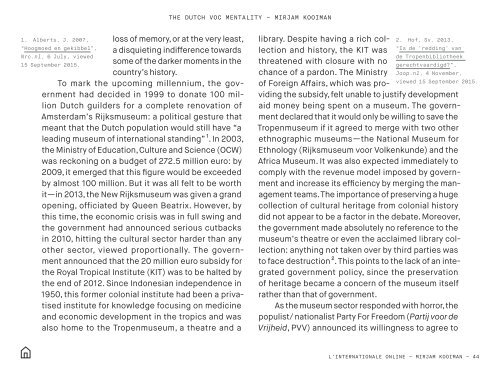DECOLONISING MUSEUMS
decolonisingmuseums-4
decolonisingmuseums-4
Create successful ePaper yourself
Turn your PDF publications into a flip-book with our unique Google optimized e-Paper software.
THE DUTCH VOC MENTALITY – MIRJAM KOOIMAN<br />
loss of memory, or at the very least,<br />
a disquieting indifference towards<br />
some of the darker moments in the<br />
country’s history.<br />
To mark the upcoming millennium, the government<br />
had decided in 1999 to donate 100 million<br />
Dutch guilders for a complete renovation of<br />
Amsterdam’s Rijksmuseum: a political gesture that<br />
meant that the Dutch population would still have “a<br />
leading museum of international standing” 1. In 2003,<br />
the Ministry of Education, Culture and Science (OCW)<br />
was reckoning on a budget of 272.5 million euro: by<br />
2009, it emerged that this figure would be exceeded<br />
by almost 100 million. But it was all felt to be worth<br />
it—in 2013, the New Rijksmuseum was given a grand<br />
opening, officiated by Queen Beatrix. However, by<br />
this time, the economic crisis was in full swing and<br />
the government had announced serious cutbacks<br />
in 2010, hitting the cultural sector harder than any<br />
other sector, viewed proportionally. The government<br />
announced that the 20 million euro subsidy for<br />
the Royal Tropical Institute (KIT) was to be halted by<br />
the end of 2012. Since Indonesian independence in<br />
1950, this former colonial institute had been a privatised<br />
institute for knowledge focusing on medicine<br />
and economic development in the tropics and was<br />
also home to the Tropenmuseum, a theatre and a<br />
1. Alberts, J. 2007,<br />
“Hoogmoed en gekibbel”,<br />
Nrc.nl, 6 July, viewed<br />
15 September 2015.<br />
library. Despite having a rich collection<br />
and history, the KIT was<br />
2. Hof, Sv. 2013,<br />
“Is de ’redding’ van<br />
de Tropenbibliotheek<br />
threatened with closure with no<br />
gerechtvaardigd?”,<br />
chance of a pardon. The Ministry Joop.nl, 4 November,<br />
of Foreign Affairs, which was providing<br />
the subsidy, felt unable to justify development<br />
aid money being spent on a museum. The government<br />
declared that it would only be willing to save the<br />
Tropenmuseum if it agreed to merge with two other<br />
ethnographic museums—the National Museum for<br />
Ethnology (Rijksmuseum voor Volkenkunde) and the<br />
Africa Museum. It was also expected immediately to<br />
comply with the revenue model imposed by government<br />
and increase its efficiency by merging the management<br />
teams. The importance of preserving a huge<br />
collection of cultural heritage from colonial history<br />
did not appear to be a factor in the debate. Moreover,<br />
the government made absolutely no reference to the<br />
museum’s theatre or even the acclaimed library collection:<br />
anything not taken over by third parties was<br />
to face destruction 2. This points to the lack of an integrated<br />
government policy, since the preservation<br />
of heritage became a concern of the museum itself<br />
rather than that of government.<br />
As the museum sector responded with horror, the<br />
populist/ nationalist Party For Freedom (Partij voor de<br />
Vrijheid, PVV) announced its willingness to agree to<br />
viewed 15 September 2015.<br />
L’INTERNATIONALE ONLINE – MIRJAM KOOIMAN – 44


